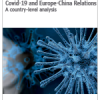Original versión in Spanish: Treinta años de políticas mediterráneas de la UE (1989-2019): un balance.
Introduction
From the EU’s perspective, 1989 was an annus mirabilis. The fall of the Berlin Wall and the end of the Cold War were events of great historical and geopolitical importance, not only for international relations, but more specifically for relations between the EU and the Mediterranean. This is not to say that the southern shore of the Mediterranean had been ignored, but the Cold War had overshadowed many of its problems and challenges. The southern Mediterranean had only served as a ‘security chessboard’ for the policies and strategies of the US and the Soviet Union. From a Western perspective, the southern Mediterranean was not seen as a region per se, but simply as a line of communication and a route for trade and oil flows that could be threatened by the presence of the Soviet Union. In short, the Mediterranean was perceived simply as a secondary theatre of antagonism between the superpowers.
In the early 1990s the EU or some of its member states were involved in multilateral policies (Renewed Mediterranean Policy) or smaller cooperation initiatives (Dialogue 5+5 and Foromed), or even NATO’s Mediterranean Dialogue. However, with the end of the bipolar system, the EU shifted its focus to the North-South divide. It considered that the Renewed Mediterranean Policy was not ambitious enough to prevent a possible destabilisation derived from socio-political and economic disparities. As a consequence, the EU felt the need to forge a more comprehensive policy towards the Mediterranean. The shift in emphasis came at a time when some controversial but influential political thinkers, such as Samuel Huntington, raised the question of the cultural dimension of security, arguing that the ‘clash of civilisations’2occurs along the lines of religiously-inspired militancy against Western values.
Such a thesis is particularly pernicious because it builds on old stereotypes and reinforces them under the guise of critical scholarship. Indeed, the idea of confusing Islamist fundamentalism with Islam as a religion is not new. As early as 1979, Edward Said, in his seminal book Orientalism, observed that trend. He stressed that ‘negative images of Islam are very much more prevalent than any others, and that such images correspond not with what Islam “is” […] but to what prominent sectors of a particular society take it to be’.3 But the timing of the publication of Samuel Huntington’s article in Foreign Affairs in 1993, just after the collapse of the Soviet Union, was undoubtedly a factor that contributed to the worldwide spread of the ‘clash of civilisations’ thesis, where ‘Islam’ (and not just Islamist groups) is presented as a kind of scapegoat for everything the West does not like in the world’s political, social and economic spheres.
Concerned about the fallacy of such a thesis, the EU felt the urgency of demonstrating the dangers that can result from such a simplistic diagnosis that overemphasises the notion of a clash of civilizations. For the vast majority of Europeans, it was clear that many of the security-related concerns in the southern Mediterranean were not military in nature or culturally based, but were primarily ‘soft security issues’.4 These included economic disparities, the demographic divide, migratory flows and the persistence of authoritarian regimes. The idea of a ‘new partnership’ emerged in this context of conflicting views about security in the Mediterranean.
This working paper seeks to present a critical overview of the EU’s latest major Mediterranean policies, analysing the context, the text and the pretext of each of these policies.
Bichara Khader
Professor Emeritus at the Catholic University of Louvain and founder of the Centre for Studies and Research on the Contemporary Arab World (CERMAC)
Haizam Amirah Fernández
Senior Analyst for the Mediterranean and Arab World, Elcano Royal Institute. Professor of International Relations at the School of Global and Public Affairs, IE University | @HaizamAmirah
1 A Spanish version of this working paper was published as a chapter in J.M. Beneyto Pérez (Dir.), J. Maillo González-Orús & B. Becerril Atienza (Coord.) (2020), Tratado de Derecho y Políticas de la Unión Europea (Tomo X): Las Relaciones de la Unión Europea con Áreas Regionales y Terceros Estados, Editorial Aranzadi, January.
The authors would like to thank Adelaide Isaacs for her assistance with the editing and proofreading of this document.
2 S. Huntington (1993), ‘The Clash of Civilizations?’, Foreign Affairs, vol. 72, nr 3, summer, p. 22-49.
3 E. Said (1981), Covering Islam: How the Media and the Experts Determine How We See the Rest of the World, Pantheon Books, 1981, p. 144. See also E. Said (1979), Orientalism, Vintage Books.
4 S. Stavridis & N. Fernández Sola (Coords.) (2009), Factores políticos y de seguridad en el área euro-mediterránea, Prensas de la Universidad de Zaragoza.
Satellite image of the Mediterranean sea. Image: NASA (Public domain)




